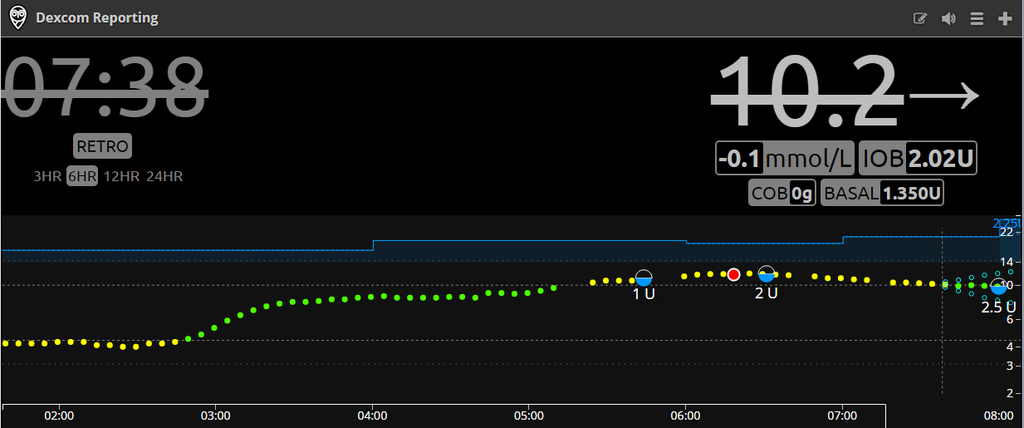- Messages
- 8,936
- Type of diabetes
- Type 1
- Treatment type
- Other
Last night, at about 2am, I was awoken by the CGM telling me I was heading low following correcting for a high fairly late. Given the time delay, it's safe to assume that I was already at a level below 4, so I ate three Glucotabs, for 12g of carbs and went back to sleep again. You can see from the trace that they had the desired effect, although the increase was slightly higher than I expected.
What was then far more interesting, from my perspective, is the enhanced dawn phenomenon effect as a result of the night-time hypo. It looks as though there is an enhanced dawn phenomenon taking place, but I know that in normal circumstances, my basal level manages that pretty much perfectly. So what we have here is the effect of a glucagon dump that was triggered by the 2am hypo.
If you discuss with an Endo, they'll tell you that the body's response to a hypo lasts a significant number of hours after it has happened, typically five to eight hours, where additional glucagon is released and your liver continues to pour glucose in. Given my eating times yesterday, that's exactly what I saw, and it's taken a shedload of corrective insulin to manage it down.
I guess the point of this is simply to make it clear that if you have a hypo, the resultant glucagon effect is quite long lasting and a nuisance. Another reason to avoid hypos!

What was then far more interesting, from my perspective, is the enhanced dawn phenomenon effect as a result of the night-time hypo. It looks as though there is an enhanced dawn phenomenon taking place, but I know that in normal circumstances, my basal level manages that pretty much perfectly. So what we have here is the effect of a glucagon dump that was triggered by the 2am hypo.
If you discuss with an Endo, they'll tell you that the body's response to a hypo lasts a significant number of hours after it has happened, typically five to eight hours, where additional glucagon is released and your liver continues to pour glucose in. Given my eating times yesterday, that's exactly what I saw, and it's taken a shedload of corrective insulin to manage it down.
I guess the point of this is simply to make it clear that if you have a hypo, the resultant glucagon effect is quite long lasting and a nuisance. Another reason to avoid hypos!


